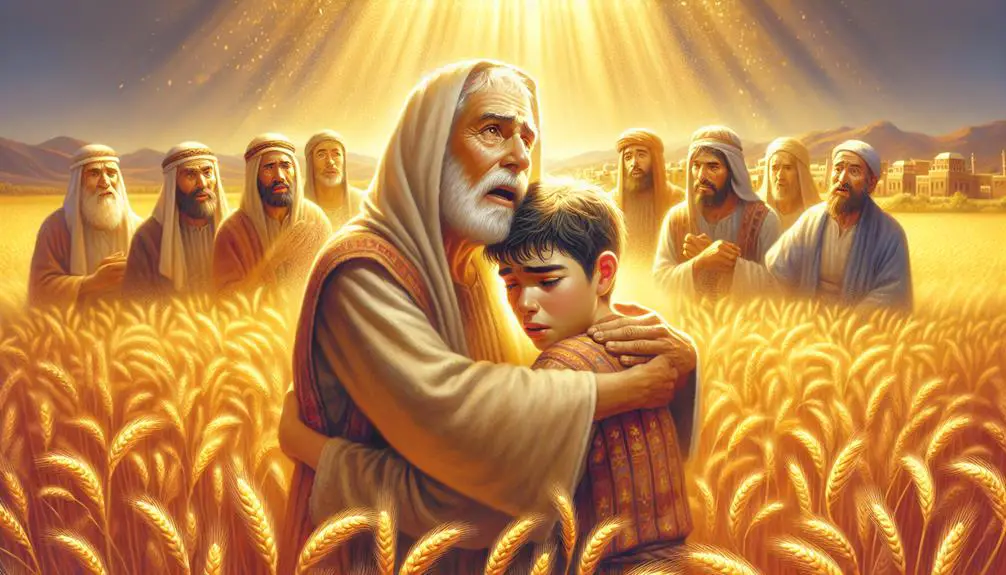Uncover timeless wisdom from biblical fathers, revealing the essence of good fatherhood and its impact on generations.

Good Father in the Bible
Did you know that the Bible mentions the word 'father' over 1,000 times?
This staggering statistic highlights the importance of fatherhood in biblical texts, presenting a wide array of paternal figures, from the profoundly faithful to the deeply flawed.
As you explore iconic biblical fathers, such as Abraham's unwavering trust, Jacob's complex family dynamics, and the unconditional love of the Prodigal Son's father, you'll uncover layers of wisdom and insight into what constitutes a good father.
This journey promises to offer a fresh perspective on these ancient narratives, revealing timeless lessons on fatherhood that remain relevant today.
Why not engage in this exploration to uncover what these stories can teach us about the essence of being a good father?
Key Takeaways
- Biblical fatherhood emphasizes sacrifice, humility, and servant leadership as moral compasses for effective parenting.
- Unconditional love and forgiveness are foundational to reconciling and nurturing familial relationships in biblical narratives.
- Favoritism and lack of discipline can lead to familial discord, underscoring the need for balance and fairness in parenting.
- Divine guidance and proactive protection are vital in guiding children's paths and ensuring their well-being.
Abraham's Test of Faith

Among the numerous narratives in the Bible, Abraham's test of faith stands out as a pivotal moment that not only challenges but also profoundly illustrates the complexity of divine obedience and human trust. This moment, found in the narrative of Abraham being commanded to sacrifice his son Isaac, encapsulates the essence of sacrificial obedience underpinned by the unwavering belief in divine promise.
You're compelled to consider the gravity of Abraham's decision within the cultural and historical context of ancient times, where child sacrifice wasn't unheard of, yet remains abhorrent. Abraham's willingness to comply with God's command reflects not a blind, unthinking obedience but a deeply rooted faith in God's righteousness and His promises. This instance serves as a litmus test for Abraham's faith, where his actions demonstrate a belief that God's promise to make him a father of nations, through Isaac, wouldn't be nullified even by Isaac's potential death.
Furthermore, your analysis should include the significance of divine intervention at the moment of sacrifice, which not only prevents the act but also reinforces the moral and ethical boundaries set by God. This intervention highlights the distinction between testing faith and endorsing practices contrary to divine principles.
In exploring Abraham's test, you're delving into the intricate dynamics of trust between the divine and the human, where sacrificial obedience becomes a conduit for fulfilling divine promises. This narrative invites you to reflect on the depth of faith required to relinquish one's most cherished possessions, trusting wholly in divine fidelity and purpose.
Jacob: Love and Favoritism

You must consider how Jacob's affection wasn't evenly distributed among his children, a factor that significantly shaped familial dynamics.
The gift of Joseph's coat of many colors symbolizes this preferential treatment and its tangible manifestations.
This favoritism, in turn, exacerbated sibling rivalry, leading to profound consequences within the narrative.
Jacob's Unequal Love Display
How did Jacob's preferential treatment of his sons reflect broader themes of love and favoritism in biblical narratives? Jacob's actions serve as a pivotal study in understanding the complex dynamics of parental equality and the emotional consequences thereof.
- Parental Equality: Jacob's unequal love underscores the biblical caution against showing favoritism among children. It highlights the importance of striving for balance and fairness in parental affection to foster a healthy family dynamic.
- Emotional Consequences: The narrative keenly illustrates the deep emotional rifts that can emerge from favoritism, affecting both the favored and less favored children's self-esteem and sibling relationships.
- Broader Themes: This story encapsulates recurring themes of love, jealousy, and redemption, offering timeless lessons on the human condition and the intricate web of family relationships.
Joseph's Coat of Many Colors
Jacob's gift of the coat of many colors to Joseph epitomizes the profound implications of parental favoritism, setting the stage for a narrative rich in familial conflict and personal transformation. This act not only signifies Jacob's undue preference but also marks Joseph as a figure destined for a path fraught with challenges and enlightenment.
The Technicolor symbolism embedded in the coat transcends mere appearance, indicating Joseph's unique role and future capabilities, particularly in dream interpretation. This coat, a tangible manifestation of Jacob's favor, serves as a catalyst for Joseph's journey, intertwining his ability to decipher dreams with his distinct status within his family.
Methodically, the narrative unfolds, revealing how favoritism and symbolic gifts can profoundly influence individual destiny and familial dynamics.
Sibling Rivalry Escalates
As Jacob's favoritism towards Joseph becomes increasingly evident, the seeds of sibling rivalry are sown, setting the stage for a complex web of familial discord and jealousy. This narrative isn't isolated but echoes through biblical history, highlighting:
- Cain's jealousy of Abel, which led to the ultimate fratricide.
- Esau's loss of both birthright and blessing, intensifying the discord between him and Jacob.
- The eventual sale of Joseph by his brothers, a consequence of unchecked jealousy and favoritism.
Each element underscores a recurring theme: unchecked favoritism and jealousy can fracture even the strongest of familial bonds. This historical pattern provides a methodical examination of human nature, emphasizing the need for balance, fairness, and understanding within family dynamics.
Moses: Leadership and Sacrifice

One must carefully examine Moses' leadership and his willingness to sacrifice for the greater good as pivotal elements that underscore his significance in biblical narratives. Moses' humility, a cornerstone of his character, played a crucial role in his ability to lead and guide his people through trying times. This humility, coupled with his role as Law giver, laid the foundation for a leadership style that was both servant-oriented and authoritative.
Moses' journey from prince to prophet didn't strip him of his innate leadership qualities; instead, it refined them, making his guidance more impactful. His willingness to confront Pharaoh, despite the personal risk, and his steadfastness in the face of his people's frequent lapses into faithlessness, highlight his sacrificial nature. Moses didn't seek leadership for personal gain but was thrust into it by divine command, and he bore this responsibility with a grace that few could muster.
His role as Law giver wasn't merely administrative. It was an act of profound sacrifice. By receiving and imparting the Law, Moses established a moral and ethical compass for his people, knowing well that he himself wouldn't enter the promised land. This ultimate sacrifice—of his dreams for the greater good of his people—illustrates a leadership style that's rare and commendable.
Analyzing Moses' leadership and sacrifice provides a blueprint for what it means to lead with humility, courage, and an unwavering commitment to the greater good. His life serves as a testament to the power of selfless leadership and the enduring impact it can have on a community.
King David's Paternal Challenges

You'll find that King David's story offers a complex view of fatherhood, marked by significant paternal challenges. His parenting flaws, particularly in handling his children's conflicts, set the stage for Absalom's rebellion, highlighting the profound impact of his decisions on his family's dynamics.
This analysis will explore how these elements contribute to our understanding of David's legacy as a father in biblical narrative.
David's Parenting Flaws
Despite his revered status, King David's parenting exhibited significant flaws, reflecting a complex interplay of neglect, favoritism, and failure to discipline, which profoundly impacted his children's lives. One pivotal moment that highlights these challenges is Amnon's crime against his half-sister Tamar. This incident, coupled with David's repentance, provides a deeper understanding of the king's parenting struggles:
- Neglect: David's lack of intervention before and after Tamar's ordeal suggests a significant oversight in protecting and delivering justice for his children.
- Favoritism: His apparent inaction towards Amnon post-crime may indicate a bias, exacerbating familial tensions.
- Failure to Discipline: David's inability to discipline Amnon effectively set a precedent for impunity among his offspring, contributing to further discord and tragedy within the family.
Absalom's Rebellion Impact
In examining Absalom's rebellion, it becomes evident that King David's paternal challenges played a critical role in the escalation of this familial conflict.
You'll find that Absalom's cunning manipulation of political alliances and military strategy highlights a profound understanding of his father's vulnerabilities. His ability to forge alliances with influential figures, leveraging his charm and David's previous missteps, underscores a strategic acumen that directly challenged his father's reign.
Moreover, Absalom's adept use of military tactics not only signifies his ambition but also reflects David's shortcomings in addressing the emotional needs and political aspirations of his children.
This intricate blend of personal vendettas and political maneuvering led to a rebellion that tested David's resolve, leadership, and the very fabric of his legacy.
The Prodigal Son's Father

Examining the story of the Prodigal Son, one can't help but notice the father's exemplary display of unconditional love and forgiveness towards his returning son. This narrative, rich in themes of redemption and grace, presents a powerful example of a good father in the Bible. The father's reaction to his son's return isn't just a simple welcome but an all-encompassing embrace of unconditional forgiveness and a celebratory return, which serves as a profound lesson for the audience.
Here are three key aspects of the father's behavior that offer a deeper meaning:
- Unconditional Forgiveness: The father doesn't demand an explanation or impose conditions for acceptance. Instead, he immediately forgives his son, showcasing an unparalleled model of love and forgiveness that transcends human understanding.
- Celebratory Return: The father's decision to throw a feast in honor of his son's return underscores the joy and value he places on reconciliation over retribution. This act symbolizes the restoration of relationships and the significance of celebrating redeemed connections.
- Open Arms Policy: Despite the son's past actions, the father eagerly awaits his return, demonstrating an unwavering hope and open-heartedness. This reflects a steadfast belief in redemption and the power of love to overcome estrangement.
Through this analysis, it's clear that the Prodigal Son's father embodies the epitome of a good father, offering invaluable lessons in unconditional love, forgiveness, and the joy found in reconciliation.
Joseph: Nurturing the Messiah

Joseph's role as the earthly father of Jesus highlights a profound example of nurturing and protective care in biblical narratives. His capacity for dream interpretation, not unlike Egypt's governor Joseph from the Old Testament, set a precedent for divine guidance in his parenting approach. This skill notably directed him to safeguard his family, illustrating an unwavering commitment to his protective role.
Analyzing Joseph's actions, it's evident that his response to divine messages was immediate and without question. When warned of Herod's intent to harm Jesus, Joseph didn't hesitate to relocate his family to Egypt, demonstrating a proactive approach to ensuring their safety. This decisive action underscores the importance of responsiveness to divine guidance in biblical parenting narratives.
To better understand Joseph's multi-faceted role, consider the following table comparing his actions to those of Egypt's governor Joseph:
Joseph, Jesus' Father |
Egypt's Governor Joseph |
|---|---|
Relied on dream interpretation for guidance |
Utilized dream interpretation to save Egypt |
Fled to Egypt to protect his family |
Rose to power in Egypt, saving nations from famine |
Demonstrated faith through action |
Exhibited wisdom and foresight in leadership |
This comparison not only highlights the recurring theme of dream interpretation and divine guidance in the Bible but also emphasizes the depth of Joseph's commitment to his role. His actions reflect a scholarly understanding of responsibility, nurturing, and protection, setting a benchmark for fatherhood in biblical contexts. Through his analytical, methodical approach to parenting, Joseph exemplifies a model of good fatherhood, rooted in faith and action.
Frequently Asked Questions
How Do Modern Psychological Theories on Parenting Compare to the Biblical Examples of Fatherhood Mentioned in the Article?
You're exploring how modern psychological concepts like Attachment theory and Parenting styles align with traditional fatherhood narratives.
Diving into this comparison, you'll find that Attachment theory emphasizes the emotional bond between parent and child, mirroring some biblical narratives of nurturing and protective father figures.
Meanwhile, diverse Parenting styles outlined in psychology may show parallels or contrasts to these examples, offering a rich field for analytical, scholarly investigation.
In What Ways Have Cultural and Societal Norms Influenced the Interpretation of These Biblical Fathers' Actions Over the Centuries?
You're exploring how cultural and societal norms have shaped the interpretation of paternal actions over time.
It's key to consider historical context and societal evolution in this analysis. As societies progress, perceptions of fatherhood and its responsibilities undergo significant shifts.
This evolution influences how past actions are viewed today. Understanding this dynamic helps you grasp the complex interplay between cultural norms and the interpretation of fatherly roles throughout history.
Are There Any Lesser-Known Biblical Figures Who Also Exemplify Qualities of a Good Father, but Are Not Mentioned in the Article?
You're exploring lesser-known characters who display exemplary paternal qualities.
Jonah's compassion, often overshadowed by his initial disobedience, reflects a nurturing spirit, suggesting qualities of patience and guidance.
Similarly, Boaz's integrity, beyond his actions towards Ruth, can be interpreted as a foundation for moral leadership within a family setting.
These figures, though not frequently highlighted for their paternal roles, offer valuable insights into the complexities of fatherhood through their actions and decisions.
How Do Non-Christian Religions and Belief Systems View and Interpret the Paternal Examples Provided by These Biblical Figures?
In exploring how non-Christian religions view biblical paternal figures, you're delving into a realm where interfaith dialogue and comparative mythology intersect.
These traditions often juxtapose their own patriarchal narratives against those from the Bible, analyzing similarities and divergences.
Through a scholarly lens, it's evident that while specific interpretations vary, many respect the moral and ethical teachings these figures embody, recognizing shared human values across diverse spiritual landscapes.
What Practical Lessons Can Contemporary Fathers Learn From These Biblical Stories That Are Applicable to Parenting in the 21st Century?
When looking at parenting today, you can learn from historical narratives. Analyzing these stories, you'll find diverse parenting styles and discipline methods that are still relevant.
It's crucial to adapt these approaches to modern contexts, ensuring they fit contemporary challenges. By methodically applying lessons on communication, empathy, and setting boundaries, you can enhance your parenting practice.
These strategies, rooted in time-tested wisdom, offer valuable insights for navigating the complexities of 21st-century fatherhood.
Conclusion
In analyzing the biblical figures of Abraham, Jacob, Moses, King David, the Prodigal Son's father, and Joseph, we find diverse expressions of fatherhood, each illuminating facets of responsibility, sacrifice, and love.
Interestingly, over 4.1 billion people globally are connected to these narratives through the Abrahamic religions, underscoring the universal resonance of these stories.
This analysis reveals that despite their imperfections, these fathers exemplify enduring principles of guidance, forgiveness, and unwavering faith, offering timeless lessons for parental figures across cultures and epochs.



Sign up